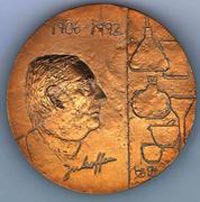American biochemist to receive this year's Inhoffen Medal

The Inhoffen Medal: the most prestigious German award in the field of natural compound chemistry.<br>HZI <br>
How do bacteria cope when exposed to toxic mercury, how are they able to outlast antibiotics, and how can they be killed using so-called “suicide inhibitors?” These are but a few of the many research topics US biochemist Christopher Walsh has devoted his career as a scientist to.
On Thursday, 25 April, Walsh will be honoured for his achievements in Braunschweig, Germany: The Harvard professor will receive the 5 000 Euro Inhoffen Medal, the single most renowned German award in the field of natural compound chemistry.
The prize, which is funded by the Friends of the Helmholtz Centre for Infection Research (HZI), is awarded on the occasion of the public Inhoffen Lecture, an event co-hosted by the HZI and the Technische Universität (TU) Braunschweig. This year, the Inhoffen Lecture is scheduled for 3 pm on Thursday, 25 April, and will be given in the HZI forum. “The award is bestowed in recognition of Walsh's impressive contribution to science,” explains Prof. Dietmar Schomburg, Chairman of the Friends of the HZI.
Bacteria use clever “assembly lines” to make active substances they need to survive. Many of these substances are of medical interest for us humans as they can be used as antibiotics, for example. Christopher T. Walsh, professor at the renowned Harvard Medical School in Boston, USA, is a leading expert in the area of bacterial “factories”.
Much of his research has been concerned with the investigation of the structure and function of enzymes, cellular catalysts, to better understand their molecular basis. Among other things, Walsh studied substances known as suicide inhibitors – compounds that, normally, are recognized and converted by some enzyme catalyst. The enzyme mistakes them for natural reaction partners, binds and converts them – leading to production of an inhibitory substance that acts to permanently block the enzyme. Suicide inhibitors that are effective against bacterial enzymes can be continually developed for application in medicine.
Walsh's work also allowed for artificially changing bacterial enzymes. This represents a major step forward for active substance biosynthesis. He also discovered how bacteria evolve resistance to the reserve antibiotic vancomycin – a discovery which helped move production of new antibiotics forward.
On the occasion of the Inhoffen Lecture, the Friends of the HZI will also be recognizing outstanding dissertations in the life sciences. Recipients of the two 1 000 Euro PhD Awards are Dr. Cornelia Chizzali and Dr. Christian Mayer. As part of their doctoral work, Chizzali studied substances that are produced by fruit trees to protect themselves against the plant disease fire blight. Mayer worked on mechanisms of immune tolerance.
In addition to the PhD Awards, the Fritz Wagner Award for advancement of biotechnology will also be bestowed. This year's 500 Euro Fritz Wagner Award goes to Patrick Rabe in recognition of his doctoral work on the synthesis and analysis of secondary metabolites produced by bacteria.
Press meeting
Before the start of the event, at 2:40 pm, media representatives will have the chance to meet the award recipients and take photographs. For additional information, please call 0531-61811401.
Hans Herloff Inhoffen and the Inhoffen Medal
In remembrance of eminent chemist Prof. Hans Herloff Inhoffen who passed away in 1992, the TU Braunschweig and the HZI (at that time called the German Research Centre for Biotechnology, GBF) have been co-organizing the Inhoffen Lecture since 1994. The award by the same name is given on the occasion of the lecture. From 1946 to 1974, Inhoffen taught at the TH Braunschweig and was the university’s acting president from 1948 to 1950. In addition, in 1965, he co-founded the Institute of Molecular Biology, Biochemistry and Biophysics (IMB), the GBF’s and thereby the HZI's predecessor.
The Helmholtz Centre for Infection Research
At the Helmholtz Centre for Infection Research (HZI) in Braunschweig, scientists are studying microbial virulence factors, host-pathogen interactions and immunity. The goal is to develop strategies for the diagnosis, prevention and therapy of human infectious diseases.
http://www.helmholtz-hzi.de/en
The Technische Universität (TU) Braunschweig
Core disciplines of the TU Braunschweig are engineering and natural sciences. They are closely linked to its other disciplines of humanities and economic, social, and educational sciences. The Technische Universität Braunschweig is one of the leading universities of technology in Germany, as witnessed by its inclusion in the top list, »TU9 – German Institutes of Technology«. Together with Leibniz Universität Hannover and TU Clausthal, the TU Braunschweig forms the Niedersächsische Technische Hochschule (NTH).
http://www.tu-braunschweig.de
Media Contact
More Information:
http://www.helmholtz-hzi.deAll latest news from the category: Awards Funding
Newest articles

Parallel Paths: Understanding Malaria Resistance in Chimpanzees and Humans
The closest relatives of humans adapt genetically to habitats and infections Survival of the Fittest: Genetic Adaptations Uncovered in Chimpanzees Görlitz, 10.01.2025. Chimpanzees have genetic adaptations that help them survive…

You are What You Eat—Stanford Study Links Fiber to Anti-Cancer Gene Modulation
The Fiber Gap: A Growing Concern in American Diets Fiber is well known to be an important part of a healthy diet, yet less than 10% of Americans eat the minimum recommended…

Trust Your Gut—RNA-Protein Discovery for Better Immunity
HIRI researchers uncover control mechanisms of polysaccharide utilization in Bacteroides thetaiotaomicron. Researchers at the Helmholtz Institute for RNA-based Infection Research (HIRI) and the Julius-Maximilians-Universität (JMU) in Würzburg have identified a…



